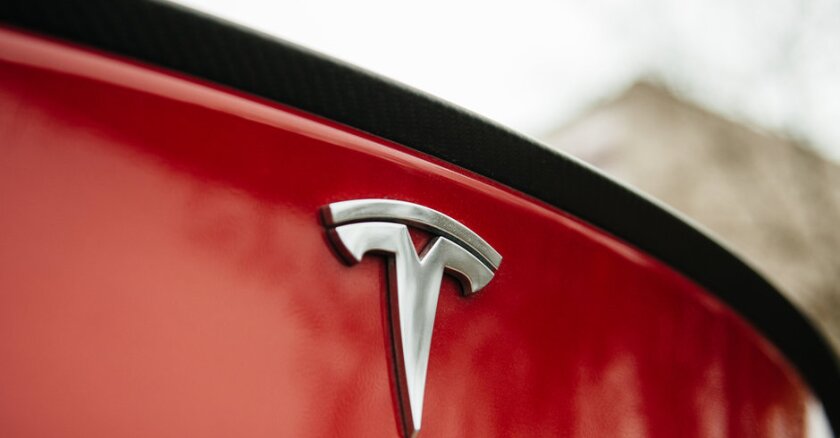A National Highway Traffic Safety Administration database identifies 113 Tesla accidents in the nine-county Bay Area since July 2021 in which autopilot had been switched on before the incident. There were 970 such accidents involving Teslas nationwide, with California having the most by a wide margin, at 353.
Driverless cars: Map shows every crash in San Francisco
The numbers aren't necessarily surprising: California has far more Teslas per capita than any other state. But they show just how big of an impact that problems with autopilot, and a recall of the cars, are likely to have here.
Tesla accidents in Northern California that may have involved autopilot include one on the Bay Bridge just over a year ago in which a Tesla Model S suddenly braked and caused an eight-car pileup, injuring nine people. In another, a Pittsburg man died after his Tesla Model S barreled into a Contra Costa County fire truck on Interstate 680 near Walnut Creek in February. The third case came in July when a Tesla Model 3 and Subaru crashed in South Lake Tahoe, leaving two dead.
The Chronicle identified those accidents through reports from law enforcement and media. The cases each line up with accidents listed in the NHTSA database.
Tesla is recalling more than 2 million vehicles after a two-year probe by the NHTSA revealed defects in the vehicles' autopilot system. During the investigation, the agency reviewed 956 crashes where autopilot was initially alleged to be in use, and then focused on 322 autopilot-involved crashes to explore frontal impacts and impacts from possible inadvertent disengagement of the system, NHTSA officials said.
"In certain circumstances when Autosteer is engaged, the prominence and scope of the feature's controls may not be sufficient to prevent driver misuse of the SAE Level 2 advanced driver-assistance feature," the NHTSA said in the recall report. The agency added that there could be an increased risk of collision if a driver did not recognize the system was "operating in situations where its functionality may be limited" and was unprepared to intervene.
The agency said the recall applies to four Tesla models: 2012-2013 Tesla Model S, 2016-2023 Tesla Model X, 2017-2023 Tesla Model 3 and 2020-2023 Tesla Model Y. Vehicles affected by the recall would, at no cost to owners, be fixed via a software update that can be completed remotely, the NHTSA said.
"The investigation found that Tesla's unique design of its Autopilot system can provide inadequate driver engagement and usage controls that can lead to foreseeable misuse of the system," an NHTSA spokesperson told the Chronicle.
Autopilot, released in 2015, is a "suite of driver assistance features that comes standard with a new car or can be purchased after delivery," Tesla wrote on its website. Full Self-Driving, which is in beta testing and must be purchased, offers the same features as autopilot, in addition to other features such as autosteer on city streets and automatically stopping at signs or lights.
It's the second Tesla recall this year. In February, Tesla recalled 362,758 of its vehicles equipped with the full self-driving beta, after the NHTSA discovered that the system would cause the car to enter intersections while in a turn-only lane, not come to a complete stop at stop signs and enter intersections during a yellow light without caution.
The agency began to require car manufacturers to report crashes in which autopilot was activated beginning in July 2021 as part of general standing order. Companies named in the NHTSA's general order, which includes Tesla, must report a crash if the system was in use within 30 seconds of the crash and if it caused property damage or injury.
In a social media post Monday, Tesla said it had a "moral obligation" to improve its "best-in-class safety systems," also adding that it was "morally indefensible" to not continue to the rollout of driver assist technology because "incontrovertible data that shows it is saving lives and preventing injury."
Missy Cummings, a former NHTSA senior safety adviser and professor at George Mason University's College of Computing and Engineering, welcomed the ruling from the agency as a step forward but expressed uncertainty about the impact it will have.
"The fact that the voluntary recall has been agreed to by Tesla, I think that's the important thing," she said. "I think that you'll see some improvements. Some is better than none. The way I read this is Tesla is willing to do the bare minimum."
Tesla asserted that the company's vehicles are safer when autopilot is engaged, citing 2022 fourth quarter data that a car using autopilot crashes once every 4.85 million miles driven. But the data is not available for public viewing. Cummings said the public cannot take Tesla at its word if the data cannot be verified.
"You can't trust anything that Tesla says if you won't let anybody independently verify the numbers," she said.
There have been additional cases in the Bay Area in which autopilot may have been a factor.
A Tesla Model X slammed into a freeway divider at high speed in March 2018 and the driver, Walter Huang, died. Huang's family filed a wrongful death lawsuit against Tesla in 2019 and alleged that the autopilot system was defective and caused his death.
The NHTSA is also investigating complaints about sudden braking and is considering a petition from Minnesota engineer Ronald Belt, who argues that it's possible for the vehicles to suddenly accelerate without a driver pushing on the accelerator and without the vehicle's data recorder detecting a malfunction of the car. The NHTSA has not yet ruled on Belt's petition.
© 2023 the San Francisco Chronicle. Distributed by Tribune Content Agency, LLC.








